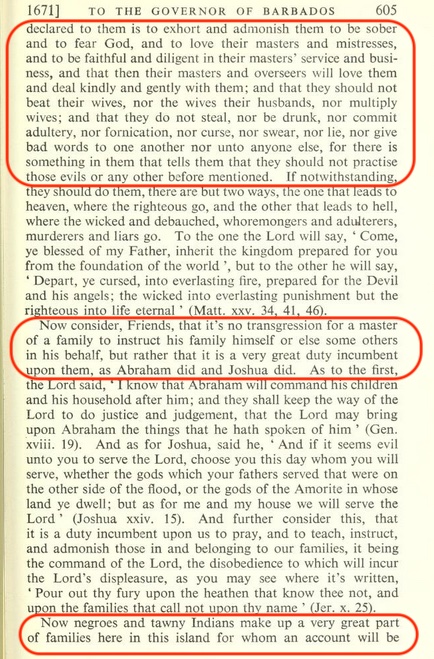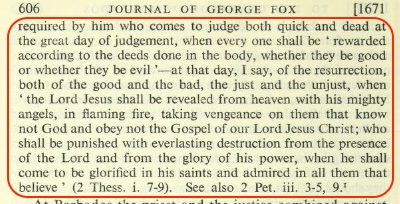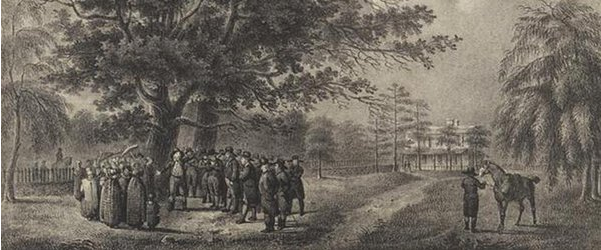We’ll take a bit of a detour today, since in 1671 CE there were no big new developments in the history of the world’s four big European-origined empires. But longtime readers will know that I have a particular interest in precisely how it was that people professing various forms of the Christian religion persuaded themselves that (a) taking other peoples’ lands and (b) engaging in the institution of slavery including the trans-oceanic transportation of enslaved persons could be “justified” within Christian doctrine. And in 1671, the founder of the still-young Quaker sect of Protestantism, George Fox, made a three-month visit to the Quakers in Barbados whose plantations relied very heavily on the exploitation of enslaved African workers. He followed that visit with a shorter trip to Jamaica and then a longer stay on the N. American mainland.
As with everything Fox did in those days, he and the co-believers around him kept lengthy records of his activities and his concerns. So today, I will explore those a little.
As we know, for the Portuguese and Spanish Catholic monarchs who pioneered the practices of armed, transoceanic empire-building, the Papal edicts of the 15th and 16th centuries did not just allow those monarchs to forcibly seize the non-European lands they ventured into along with all their inhabitants, they actually encouraged or even ordered the colonizers to force Christian conversion upon the residents of lands seized by the process of colony-building, using whatever force was necessary. And “using” the resources of the lands colonized could (and probably, under the papal edicts also should) include exploiting the labor of all the residents of the lands– either there, where those people had lived for generations, or elsewhere, far across the oceans, if that was better for the colonizing project. Because the whole project was thought of as being “for the glory of God”.
The two new powers that had launched their big empire-building projects at the dawn of the 17th century, England and the Dutch UPs, were notably motivated in all their significant actions by their adherence to Protestantism. They had no Papal edicts to justify or motivate their empire-building actions. The motivations for both the new colonizing countries were much more nakedly commercial, or just blatantly profit-seeking. It is true that many of the English settlers in “New England” were pursuing their own specific forms of Puritan “Godly destiny”, though very, very few of them seemed to be much troubled by the fact that their colonizing project involved the displacement, impoverishment, and very often expulsion of the Indigenous peoples there. (Roger Williams had been kicked out of the Massachusetts Bay Colony for expressing his qualms on this point.) But other than in New England, the colony-planting projects that the English and Dutch pursued all around the world had only a thin veneer of “Christian” justification or motivation attached to them. In the English-colonial world, however, the little colonies established on distant continents were necessarily caught up to some extent in the ferment of all the religio-political movements that were roiling the homeland. The “Puritans” were a force not only in New England but also in the Bahamas and Providence Island. Elsewhere, too, colonial communities got caught up in the differences among Puritans, Anglicans, Brownians (Baptists), Quakers, and others.
I have a special concern for the Quakers, for two reasons. Firstly, it is my home congregation, so I feel a special responsibility to understand Quaker history. Second, Quakers have a wide reputation in the United States for having stood at the forefront of the anti-slavery movement in the country. That reputation, I think, is not wholly deserved; and it certainly cannot be adequately evaluated unless we acknowledge that for a century or more before most Quaker bodies declared themselves against slavery, large numbers of Quakers had been deeply involved in, and had profited handsomely from, the institution of slavery.
The involvement of Quakers in the institution of slavery started– as did so many other facets of English/British history– in the slavery-reliant sugarcane plantations that by the middle of the 17th century were coming to take over the whole of the island of Barbados.
George Fox and the “Valiant Sixty” of his first converts were inveterate evangelizers, and in 1655 the first two Quaker missionaries, Ann Austin and Mary Fisher, arrived in Barbados to try to seek converts there. Katharine Gerbner, in her book Christian Slavery, writes (p.51) that “their first converts included slave-owning planters, merchants, indentured servants, and craftsmen.” But not, as you will notice, any of the enslaved.
The early planters on Barbados had often been Church of England people. But the C of E never had any mechanisms such as the Catholic church had in the Portuguese and Spanish empires for urging (or forcing) Christianity upon non-Christians or for enforcing the orthodoxy of all the believers. The handful of Anglican churches in Barbados served as social and administrative gathering places and were locally funded. That provided plenty of space for Quakers or other non-Anglicans to come in and try to convince the planters and other Europeans of the righteousness of their sect. Plus, during the years of the Commonwealth in England, the Anglicans were definitely on the defensive.
In 1657, George Fox wrote an “epistle” from London addressed ” To Friends Beyond The Sea, That Have Blacks And Indian Slaves”. In it, he said:
Dear Friends, – I was moved to write these things to you in all those plantations. God, that made the world, and all things therein, giveth life and breath to all, and they all have their life and moving, and their being in him, he is the God of the spirits of the flesh, and is no respecter of persons And he hath made all nations of one blood to dwell upon the face of the earth, and his eyes are over all the works of his hands, and seeth every thing that is done under the whole of heaven… And the gospel is preached to every creature under heaven; which is the power that giveth liberty and freedom, and is glad tidings to every captivated creature under the whole heavens… For Christ is given for a covenant to the people, and a light to the Gentiles, and to enlighten them, who is the glory of Israel, and God’s “salvation to the ends of the earth.” And so ye are to have the mind of Christ, and to be merciful, as your heavenly Father is merciful.
1657 was the same year that Richard Ligon’s true and Exact History of the island of Barbados was published– the same volume in which Ligon recounted how an enslaver he had met there in 1647 had told him he could not baptize one of the man’s enslaved worked because “a Christian cannot be a slave.” But it seems that in his epistle, Fox was urging conversion of the enslaved…
During his 1671 sojourn in Barbados, Fox and his party stayed with local Quakers, attended an apparently large number Quaker meetings for worship including some with “negroes”, and met many people around the island, including the Governor, whom he apparently somewhat liked. Toward the end of his stay, he penned a letter to the Governor and Assembly of Barbados, which can be viewed in full-text here (pp.602-06).
The first half of this letter is taken up with a vigorous, theologically argued defense of charges that Quakers aren’t really Christians. But at the bottom of p.604 he addresses “Another slander and lie they have cast upon us… namely, that we should teach the negroes to rebel, a thing we do utterly abhor and detest in and from our hearts…. “
He provides a strong defense against this charge, too, stressing that Quakers have told the negroes “to be sober and to fear God, and to love their masters and mistresses, and to be faithful and diligent in their masters’ service… “
He then segues into an argument that would get increasing attention from him and other Quakers over the years that followed, namely that the plantation is kind of like a large household and that “it is not transgression for a master of a family to instruct his family himself… but rather that it is a very great duty incumbent upon them, as Abraham did and Joshua did.” This essentially gave broad permission for an enslaver to “chastise” the enslaved people working for him.
In the epistle, however, Fox provided some “balance” for this permission by saying that enslavers would be judged by God in the hereafter for how they treated the enslaved working for them.
At least, that’s my reading of his 1671 epistle. You can judge for yourself. This is from the bottom of p.604 through the top of p.606:



After leaving Barbados, Fox spent seven weeks in Jamaica then sailed to Maryland and Virginia where he met an “Indian emperor” and “two Indian kings” and tried to persuade them to become Quakers (p.617.) He went to Flushing, New York, and to Rhode Island. (The banner image above is an engraving of him preaching in a park in Flushing.)
English-WP says this about his time on the mainland:
Fox’s first landfall on the North American continent was at Maryland, where he participated in a four-day meeting of local Quakers. He remained there while various of his English companions travelled to the other colonies, because he wished to meet some Native Americans who were interested in Quaker ways—though he relates that they had “a great dispute” among themselves about whether to participate in the meeting. Fox was impressed by their general demeanour, which he saw as “courteous and loving”. He resented the suggestion (from a man in North Carolina) that “the Light and Spirit of God … was not in the Indians”, a proposition which Fox rejected. Fox left no record of encountering slaves on the mainland.
Elsewhere in the colonies, Fox helped to establish organizational systems for the Friends, along the same lines as he had done in Britain. He also preached to many non-Quakers, some but not all of whom were converted.
Following extensive travels around the various American colonies, George Fox returned to England in June 1673 confident that his movement was firmly established there.
